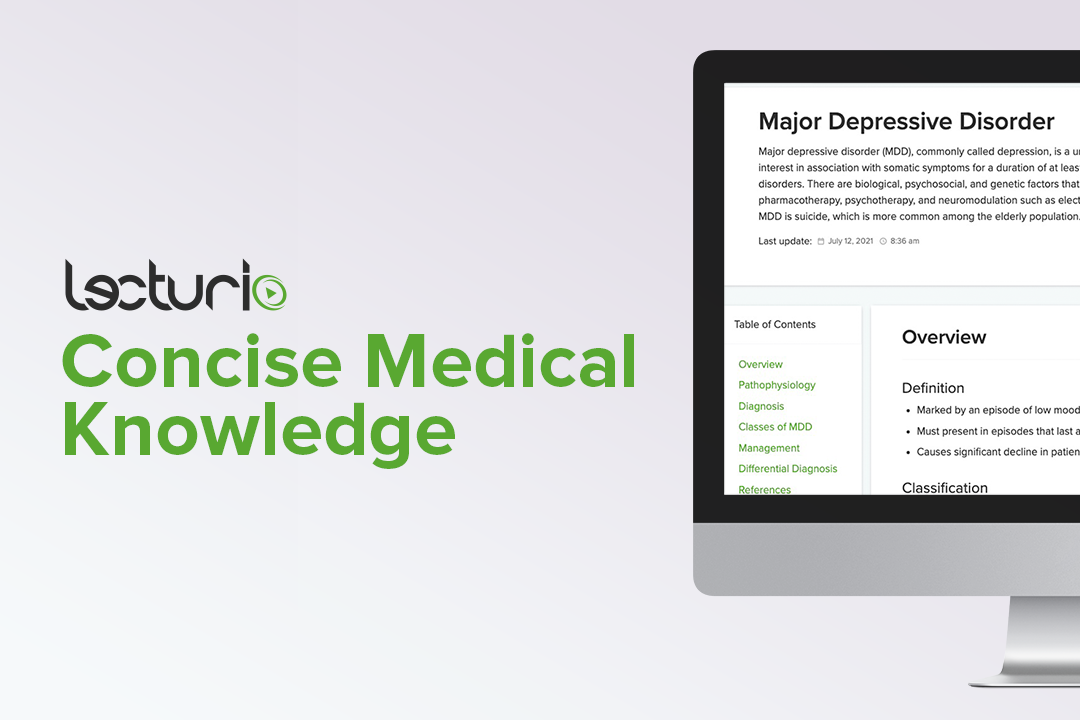Playlist
Show Playlist
Hide Playlist
Depression: Diagnosis and Symptoms
-
Slides Depression.pdf
-
Download Lecture Overview
00:01 Let's talk a little bit now about the symptoms of depression and how you actually go about diagnosing it. 00:06 Very important again, because as we just learned, many people will be diagnosed with depression. So let's consider the following example. 00:15 When you're talking about the diagnosis of depression, patient must meet at least five of these criteria five or more. 00:24 And of note one of the criteria must be depressed mood almost every day for about two weeks. 00:31 Also anhedonia. 00:33 That's decreased interest or pleasure in activities that someone once found enjoyable. So you might encounter a patient who used to play basketball or soccer, and all of a sudden they're not interested anymore. 00:44 That would be an example of anhedonia. 00:48 Someone might experience appetite or weight changes. 00:51 This can be either eating too much or too little. 00:55 Also sleep disturbance, which can be hypersomnolence sleeping for hours over seven, eight, ten, 12, 14 hours in a day or even more, or decreased sleep where somebody is barely getting any rest. 01:12 Another key factor is to ask people what time of day they wake up, often very early awakening. 01:19 So waking up early in the morning before the sun comes up can be a sign associated with depression. Psychomotor agitation or retardation are other symptoms of depression. 01:30 So this would look like a patient who's very anxious and fidgety, moving around a lot, or having retarded psychomotor function where they barely move. 01:40 Maybe they describe to you that they just can't get out of bed, that their body feels like lead and they just can't move even though they're wide awake. 01:48 Loss of energy is another symptom, as is feeling worthless or excessively guilty about something out of their control. 01:57 Also trouble concentrating. 02:00 So patient might describe to you that all of a sudden their work colleagues are telling them that their work isn't quite as good anymore, or they're not keeping up with tasks like they once did. 02:09 That can be a subtle sign of depression. 02:12 And finally, recurrent thoughts of suicide can be another sign of major depression. 02:19 Because suicide is such an important component of psychiatry, I want to emphasize again here the importance of asking patients about suicide and self-harm, and then always going one step further to ask them if they have any plan to harm themselves or any intention to do so. 02:38 When you're assessing someone for depression, it's very critical that you also ask them about how their symptoms are influencing their social and occupational functioning, because it's not enough to meet five or more of the depressed symptom criteria, but the symptoms also have to cause a marked impairment in this person's ability to function in day to day life. 03:00 Also, it's vital that you rule out that their symptoms could be due to a medical illness or a substance use problem. 03:09 There are several types of major depressive disorders. 03:13 Let's consider a few. 03:14 There's anxious distress. 03:17 Atypical features. 03:19 Catatonia. Psychotic symptoms. 03:24 Dysthymia, seasonal patterns, melancholia, mixed episodes, and also peripartum depression. 03:34 We'll go through these in a little bit more detail later. 03:39 I want to summarize first those nine target symptoms of depression that we talked about earlier. 03:45 And remember a patient has to meet five or more of these, with one of two symptoms being either loss of interest or depressed mood in order to qualify for the depression diagnosis. 03:57 A really handy way to remember the target symptoms is this mnemonic SIGECAPS So let's go through that. 04:04 This is really going to help you remember the depressed symptoms. 04:08 So the S stands for sleep. 04:10 The I is for interest being low such as anhedonia. 04:14 There's guilt energy changes concentration difficulties, appetite changes, psychomotor activity or retardation and suicidal thinking. 04:25 And these again are the symptoms the target symptoms that you're screening for in the patient whom you suspect might have depression. 04:35 Just like with every psychiatric disorder, it is critical that you rule out general medical conditions before diagnosing a psychiatric disorder. There are a lot of medical conditions or problems that can mimic depression. These can be easily treated in reversed. 04:52 So check out this list of the major medical causes of depression. 04:57 It includes cerebrovascular disease, endocrine problems, neurology problems, various viruses, cancer, collagen, vascular diseases, and also chronic pain. 05:09 There are also substances that can cause depression. 05:13 So here's a list of a few of the common causes of, uh, depression brought on by actually a substance, whether it's an illicit use or actually a medication. 05:25 Um, so some of the ones to highlight are things like alcohol. 05:29 This can very much bring on something that looks like depression, but so can prescribed drugs, things like diuretics and beta blockers. 05:37 So keep this in mind when you're assessing a patient. 05:43 There can also be depressive symptoms due to specific medications. 05:47 And this is a more exhaustive list here. 05:49 So for any patient whom you're considering a diagnosis for depression it's very important to do a couple of things. 05:56 One is to do a thorough medical history as well as a physical exam. You really need to screen them for what kind of medical conditions they have or symptoms of a medical condition, because that might be very treatable. 06:10 It's also important to obtain an exhaustive medication list from your patient, including a list of over the counter medications that they're taking, because often these can mimic symptoms of depression, just as alcohol and illicit substances can also bring about the target symptoms. 06:28 For depression, it's important as well to do a screening by doing some baseline blood work or lab work on your patient, checking things like a complete blood count, ruling out viruses, checking their renal and kidney, their renal or kidney function, and also their liver function. 06:47 You always want to check a thyroid hormone as well as their vitamins such as B12 and folate. 06:53 You always want to do a urine tox screen as well, to make sure there aren't any drugs that could be in their system, accounting for their symptoms.
About the Lecture
The lecture Depression: Diagnosis and Symptoms by Helen Farrell, MD is from the course Mood Disorders. It contains the following chapters:
- Cause of Depression
- Types of Depression
- Rule Out General Medical Conditions
Included Quiz Questions
Which of the following is NOT a diagnostic criterion for major depression?
- Alternating mood between depression and anxiety
- Psychomotor agitation or retardation.
- Recurrent thoughts of suicide.
- Loss of interest in once pleasurable activities (anhedonia)
- Changes in appetite and weight.
Which of the following options would NOT provide relevant information when diagnosing major depression?
- Obtain EEG of brain
- Take detailed info regarding current medication, including over the counter drugs
- Take a thorough medical history and do a complete physical exam
- Check complete blood counts, renal, liver functions tests, and urine drug screen
- Check levels of vitamins and thyroid hormones
Which of the following is NOT a type of major depressive disorder?
- Mixed
- Atypical
- Dysthymia
- Seasonal
Customer reviews
5,0 of 5 stars
| 5 Stars |
|
2 |
| 4 Stars |
|
0 |
| 3 Stars |
|
0 |
| 2 Stars |
|
0 |
| 1 Star |
|
0 |
Quick but thorough review of the content. Appreciate the mnemonic.
great she is incredible, very articulate has speaks with meaningful words




